| |
|
Aphanocapsa
Cyanobacterium (no
chloroplast, cells frequently blue-green in colour). Colony spherical
/ subspherical (in aquatic species), with spherical cells irregularly
arranged in mucilage. The sheath may have an indistinct boundary, but
has an outer layer free of cells. The cells are quite densely packed,
with pairs due to recent cell division, successive divisions in different
planes.
|
|
| |
|
|
|
| |
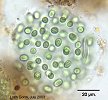
Aphanothece microscopica
|
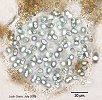
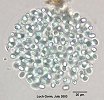
?Aphanothece stagnina
|
|
| |
Aphanothece
Cyanobacterium (no
chloroplast, cells frequently blue-green in colour). Colony spherical
/ subspherical
or irregular, with ovoid or cylindrical cells embedded in mucilage,
closely packed, sometimes with individual sheaths. Cell division in
1 plane
|
|
| |
|
|
|
| |
|
Asterococcus
Chlorophyte (chloroplast
present). Spherical cells embedded in a mucilage sheath which may be
lamellate (concentric). Single chloroplast is stellate (arms sometimes
expanded on reaching edge of cell), with a central pyrenoid.
|
|
| |
|
|
|
| |
|
Botryococcus
Chlorophyte (chloroplast
present, net-like with single pyrenoid, but usually hard to see). Colony
usually composed of sub-colonies visibly connected by strings of mucilage,
may be green, olive-green or orange. Cells closely packed in a tough
wrinkled mucilage which makes them hard to see. Contain oil droplets
which may be squeezed out under a coverslip, along with the cells.
|
|
| |
|
|
|
|
|
|
|
| |
Calothrix
Cyanobacterium,
forming filaments. May be single or in small colonies. Trichomes are
tapering with a heterocyst at the base, occasionally showing false
branching (see second picture above), and enclosed in a sheath. Cell
dimensions, presence of intercalary heterocysts (between the cells),
colour and lamellation of sheath are features which distinguish species.
|
|
| |
|
|
|
| |
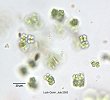
Chroococcus dispersus
|
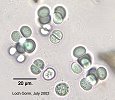
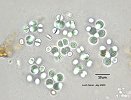
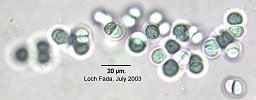
Chroococcus limneticus |
|
| |
Chroococcus
Cyanobacterium,
forming colonies of small groups of cells in mucilage. Cells spherical
or subspherical, may have individual sheaths (not in the two species
shown here).
|
|
| |
|
|
|
| |
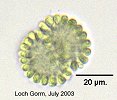  Coelosphaerium sp.
Coelosphaerium sp. |
 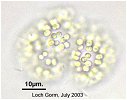
Coelosphaerium sp. |
|
| |
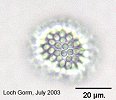
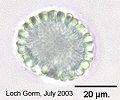 ? Coelosphaerium
? Coelosphaerium |
Coelosphaerium
Cyanobacterium,
forming spherical colonies of tightly packed spherical or subspherical
cells arranged around the periphery of the colony, forming a hollow
ball. No stalks connecting cells. The mucilage sheath may be evident
as a layer around the outside of the cells. The pictures show surface
and equatorial views.
|
|
| |
|
|
|
| |
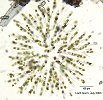 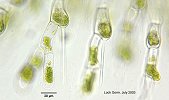
Coleochaete pulvinata |
Coleochaete
Chlorophyte, clearly
evident parietal chloroplast with 1 or more pyrenoids. Plant is a branched
filament which bears hair cells (NB not bulbous as in Bulbochaete).
Branching repeated, colony spherical / subspherical, embedded in dense
mucilage.
|
|
| |
|
|
|
| |
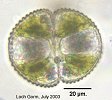
Cosmarium botrytis |


Cosmarium botrytis |
|
| |
|
|
|
| |
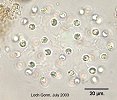 Dictyosphaerium
Dictyosphaerium
|
Dictyosphaerium
Colony in spherical
or globular mucilage, cells in pairs at the ends of branched stalks.
Dictyosphaerium is a chlorophyte, but the chloroplast may be hard to
distinguish in smaller cells (compare with Snowella).
|
|
| |
|
|
|
|
|
|
|
|
|
|
|
|
|
| |
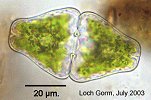
Euastrum ansatum |


Euastrum verrucosum |
|
| |
|
|
|
| |
|
Eucapsis
Cyanobacterium.
Spherical cells forming colonies of 4 or multiples, in a cubic arrangement
of regular rows. The mucilage sheath may be layered. Cells 2-7µm.
|
|
| |
|
|
|
| |
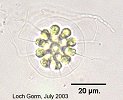 ?Eudorina
?Eudorina |
|
|
| |
|
|
|
| |
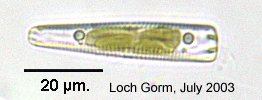 ? Gomphonema
? Gomphonema |
|
|
| |
|
|
|
| |
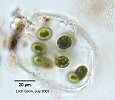
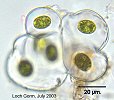
Gloeocystis vesiculosa |
|
|
| |
|
Gomphosphaeria
Cyanobacterium (no
chloroplast). Colony spherical. Cells packed around periphery of colony,
usually heart-shaped, 4-10x8-12µm.
|
|
| |
|
|
|
| |
|
|
|
|
|

 Gyrosigma
Gyrosigma |
|
|
|
| |
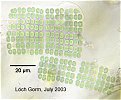 Merismopedia elegans
Merismopedia elegans
|
Merismopedia
Cyanobacterium forming
flat plates of cells arranged in regular rows.
|
|
| |
|
|
|
| |
|
|
|
| |
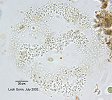
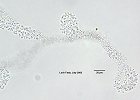
Microcystis aeruginosa |

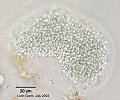
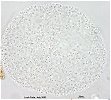
Microcystis flos-aquae |
|
|
|
Microcystis
Cyanobacterium,
forming irregular or subspherical colonies in mucilage. Cells spherical
/ subspherical are crowded, irregularly arranged.
M. aeruginosa has cells 4-9µm diameter, colony becomes clathrate
(divided) with age, usually has an outer layer free of cells.
M. flos-aquae is 2.5-5µm, forming spherical or irregular colonies,
cells densely packed and no cell-free outer layer.
|
|
| |
|
|
|
| |
|
Nostoc
|
|
| |
|
|
|
| |


Oocystis sp. |
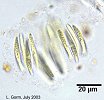
Quadrigula closterioides |
|
| |
|
|
|
| |
|
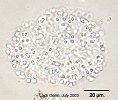
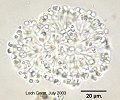 |
|
| |
|

 ?Snowella ?Snowella
|
|
| |
|
|
|
| |
|
|
|
| |
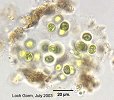
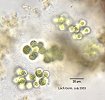 ? Sphaerocystis
? Sphaerocystis
|
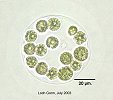 ? Sphaerocystis
? Sphaerocystis |
|
| |
|
|
|
|
|

Spondylosium planum |
|
| |
|
|
|
| |
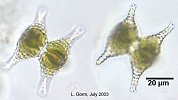
Staurastrum cingulum |
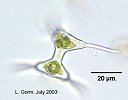

Staurodesmus mamillatus |
|
| |
|
|
|
| |
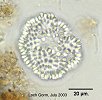
 Woronichinia
Woronichinia
|
 ?Woronichinia
?Woronichinia
|
|
| |
|
|
|
| |
|
|
|